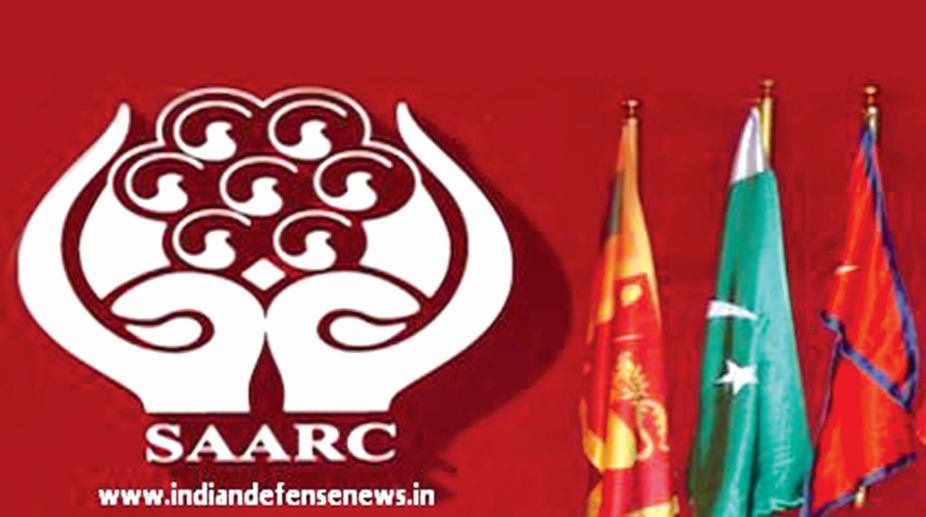Champions Trophy: Shreyas Iyer finishes as second-highest run-scorer in tournament
Iyer might have missed out on the much-deserved half-century but he was involved in a crucial 61-run fourth-wicket partnership with Axar Patel in the chase of 252.

SAARC Logo.
India’s refusal to attend the South Asian Association for Regional Cooperation (Saarc) summit in Pakistan in 2016 had pushed the organisation almost into a state of oblivion. With India leading the charge, Bangladesh, Afghanistan and Bhutan had refused to attend the summit in Pakistan.
As per the rules of Saarc, even if one nation turns down the invitation, the meeting is deemed cancelled. Thus, the others had to accept the Indian decision.
Advertisement
Though humiliated, Pakistan had no choice but to maintain silence. The BRICS summit last year had almost all Saarc members present as members of BIMSTEC (Bay of Bengal Initiative for Multi-Sectoral Technical and Economic Cooperation). India has over time created alternate organisations with the same SAARC nations, keeping Pakistan out. Recently Pakistan has begun displaying a desire to re-ignite the Saarc flame.
Advertisement
Realistically, Saarc is only a forum for leaders to meet. It should have led to enhanced economic cooperation, free movement of people and growth; however, it has been dominated by the Indo-Pak rivalry. Hence as an organisation, its utility remains questionable and growth prospects limited.
However, conduct of the summit is an issue which impacts the reputation and standing of the host country.
While nothing would move in Pakistan till the elections and formation of the new government, the present leadership has slowly begun seeking support of countries for a summit in Islamabad later this year. Prime Minister Abbasi visited Kathmandu soon after Mr Oli was designated as the Prime Minister and the joint statement mentioned re-commencing the stalled Saarc summit.
Recently, the visit of the Sri Lankan President to Islamabad also had early convening of the Saarc summit mentioned in the joint statement.
The visit by the Pakistan army chief to Maldives enhanced military cooperation between the two nations.
Though Saarc was not mentioned in any statement issued during the visit, however, the growing bonhomie would indicate Maldives would be willing to support the conduct of the meet. The growing distance between India and Maldives would ensure that it would join Nepal and Sri Lanka in supporting the hosting of the summit.
India had in the past always hesitated to impose its will and intentions on Saarc, as it did not wish to be seen as the Big Brother of the region that seeks to dominate smaller nations. The size and location of the nation, along with its economic growth and military power had smaller neighbours concerned about its attitude. India has in recent times, enhanced its relations with almost all neighbors. Its economic support and provision of aid has expelled this fear.
Hence, when it took the decision to skip the Pakistan summit, it received support from many members of the grouping. Therefore, it was Pakistan that was isolated on this occasion. Presently, with some members seeking to restart the process, India needs to carefully consider its options.
Pakistan’s reluctance to accept most proposals made by India in Saarc summits compelled India to move on its own to enhance direct cooperation with members of the group, bypassing Saarc. Hence, the utility of Saarc is reduced. With Pakistan seeking support for conducting the meet and India reluctant, it has become a diplomatic game.
In case most nations, including those that had earlier backed the Indian decision to boycott the summit, change their minds, India would be compelled to agree, or it would be termed as being responsible for the demise of an institution of which it was a founder member.
In such a scenario, Pakistan would emerge the winner. If the summit remains cancelled, then India would emerge on top. Therefore, it is Pakistan which is rushing ahead, seeking to draw countries to support the initiative, rather than India.
With the 2019 elections looming large, India must be careful on the option which it would take. The Indian stance on Pakistan stopping support to terror groups was the reason earlier; the situation has not changed. Hence, a change in Indian stance, despite pressure from neighbours, would open doors for the opposition to enhance criticism of the government.
The chances of Afghanistan agreeing to attend the summit, as increased attacks by Pak-supported Taliban are on the rise, are low. Therefore, India is bound to have their support. Bangladesh remains unhappy with Pakistan, however elections around the corner could always throw in a surprise.
If the Bangladesh Nationalist Party (BNP) headed by Khalida Zia comes to power, it may tow the Pak line. Further, with Bangladesh joining the BRI and Chinese investments increasing, there could be pressure from China to attend. In this scenario, India may come under increasing pressure.
For Pakistan, which has visualised the present Indian government as being strong and willing to up the ante, its removal would be beneficial. Hence, if India agrees to attend the summit and there is a strike, it would impact vote banks, reducing support to the ruling alliance. Thus, the policy dilemma in Delhi.
Since the window for conducting a Saarc summit is small, post the formation of a new government in Pakistan and elections within a few months in India, New Delhi needs to calibrate its decision carefully. It must stick to its stance, yet not be projected as a hinderance to development of the region.
It must continue claiming that unless Pakistan changes its spots, there can be no cooperation, hence Saarc would bear no fruit. Simultaneously, it must avoid bringing Saarc into statements when interacting with its immediate neighbours, thus enhancing one-to-one cooperation, which bears more fruit than Saarc.
The writer is a retired Major-General of the Indian Army.
Advertisement